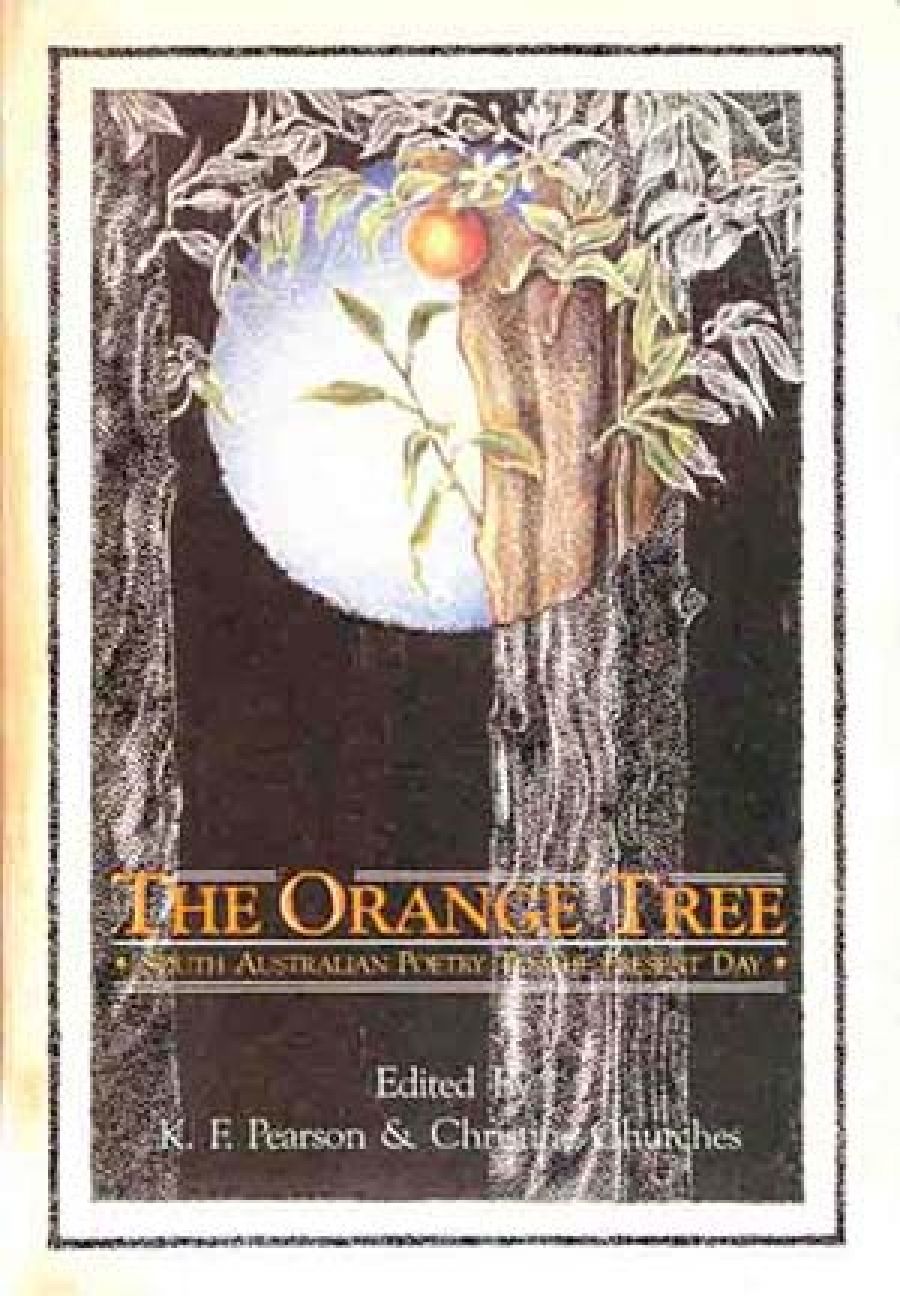
- Free Article: No
- Contents Category: Poetry
- Review Article: Yes
- Online Only: No
- Custom Highlight Text:
Anthologists face more than one dilemma of choice, beside that of personal preference. Is it better to show more of fewer poets, and give a true picture of their qualities and scope, to range widely across the landscape of the art, or reach a compromise between these methods? There are excellent anthologies in each genre.
- Book 1 Title: The Orange Tree
- Book 1 Subtitle: South Australian poetry to the present day
- Book 1 Biblio: Wakefield Press, $14.95 pb, 220 pp
K.F. Pearson and Christine have chosen the third method, with the scatter occurring when they come to recent poets. Which is regrettable, for there is no dearth of recent poets worth inclusion, while the problem for the early years is definitely one of dearth.
By their showing, the nineteenth century produced in South Australia a rather small number of good poets, and most of these left early or late for the more populous states. Pearson and Churches have made the decision to claim for their state all top poets born there, so that Francis Webb, who left at the age of two, and John Shaw Neilson, who was under ten when his family crossed the border, help to bulk out the early section of this book.
As does C.J. Dennis, another native son claimed for the state, a claim Victorians will dispute. But there is a logical basis for these inclusions: in these and some other similar cases, the poems chosen reflect the ambience of South Australia, can be considered to refer to it, and in the case of Webb’s ‘Eyre All Alone’ the explorer sets out on his Nullabor trek from Adelaide, to which he refers often.
I am writing this review from page proofs to catch a deadline, so if there is projected a foreword these choices may well be discussed in it. Such a foreword seems likely, in view of the inclusion of Ern Malley, a stateless, indeed bodiless poet, and the inclusion of some of the Jindyworobaks, who deserve a note.
Of migrants into the state there are plenty, their presence in this anthology an indication of the flourishing of the arts in SA today, its active groups of poets, the strong state supported publishing programs.
Scarcely a woman among the poets until we come to recent years, dearth again the obvious reason for this. There is no evidence of a blossoming such as there was in Victoria early this century.
What of the poetry itself? The collection tends to the sober, the restrained and concerned, lightened by wit occasionally, like the erudite, but accessible John Bray. Indeed when one starts to count up there is a nice sense of playfulness shown by several poets, Andrew Taylor, Ian Mudie (‘They’ll Tell You about Me’), Max Fatchen, Richard Tipping and others. So where do I get this sober impression? It stems l think from what amounts pagewise to a quite small section of the book, the first hundred years, represented here necessarily, as this is a commemorative anthology, but containing poems which don’t maintain the general high standard of this collection, and notably lack the firm voice, the energy of the recent examples. There are Aboriginal poems translated with varying success by various hands. Mrs Bode puts into the mouth of her ‘Lubra’ her own sentiments of a concerned nineteenth century lady. Even Adam Lindsay Gordon (another sojourner) sounds flat, cantering rather than galloping, sentimental, very Victorian. The World War I poems make sad reading, outspoken in their day, they now seem unconvincing; the moderns seem to have almost given up any attempt to write of war directly, as virtually unwritable.
As is any attempt to do justice to the poets in this anthology in any brief review. There has been a truly remarkable flowering of poetry in South Australia of recent years. One would like to list every name here from Geoffrey Dutton on, and the poems selected by Pearson and Churches – whose own contributions are outstanding – are truly representative and worthy of each individual poet. Something that is most striking is the strengthening of voice and craft in some of the poets here, with a first book only just behind them, or about to appear; poets like Jeff Guess, Jan Owen, Rob Johnson, Jeri Kroll. There’s a strong future ahead for South Australian poetry, that’s certain.
There is not much said here of urban life, though perhaps there’s little left to say that is not said, briefly and tellingly, by Andrew Taylor in ‘Adelaide’. Poems have been written, and well, about the city’s underface, that I’d have expected to see here.
Every reader will find a poet they’d like to see more fully represented – I saw only one poem from Jenny Boult – but there is almost nothing I would wish away in this latter part of the Anthology.
A fine collection and a fine job done by K.F. Pearson and Christine Churches, an Anthology South Australia can be proud of.


Comments powered by CComment